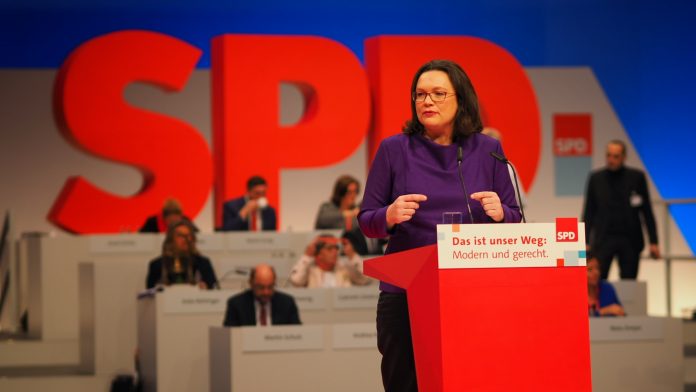German Chancellor Angela Merkel‘s coalition may be in trouble following the resignation of Germany’s SPD leader, Andrea Nahles. She announced her decision to step down after her party suffered a big loss in the European elections.
“The discussions within the parliamentary group and the large amount of feedback from the party have shown me that there is no longer support for me in holding these offices,” Nahles wrote in a statement to SPD members on June 2. She said she would step down as party leader on June 3 and as parliamentary leader on June 4, and according to some media reports was also going to resign her seat in the Bundestag, though a date for that has not been set.
As reported by Deutsche Welle (DW), Germany’s international broadcaster, the choice of Nahles’ successor could prove crucial for Merkel, whose conservative Christian Democrats CDU/CSU lead the German government in coalition with the Social Democrats. A more left-leaning leader of the SPD could take the party out of the alliance, potentially ending Merkel’s chancellorship.
Merkel’s successor as party leader, Annegret Kramp-Karrenbauer, said she had acknowledged Nahles’ resignation with great respect. She said: “I expect the SPD will make the now necessary personnel decisions quickly, so as not to impair the ability of the grand coalition to act. We remain committed to the grand coalition.”
One hour later, Merkel said: “We will continue the government’s work with all seriousness, and above all greatly conscious of our responsibility. The issues we must solve are plain — in Germany, in Europe and in the rest of the world.”
Three vice presidents of the SPD will lead provisionally the party on an interim basis until the new leader is elected.
Manuela Schwesig and Malu Dreyer are the state premiers in Mecklenburg-Western Pomerania and Rhineland-Palatinate respectively. Thorsten Schäfer-Gümbel leads the opposition SPD faction in the Hesse state parliament.
However the new party leader is not expected to be elected until December’s party conference.

